The University of Michigan-Shanghai Jiao Tong University Joint Institute (UM-SJTU JI, JI hereafter) research team composed of four doctoral students and one master student have received high recognition in a global competition organized by IEEE, the world’s largest technical professional organization dedicated to advancing technology for the benefit of humanity.
The master student Tianyu Gong and doctoral students including Huan Zhang, Yaoxia Shao, Ning Kang and Haojun Qin (all from the JI Dynamic System Control Laboratory) won a Top 10 1st Stage Proposal Award in the Inaugural IEEE Global Student Wireless Power Competition with their team project “A Six-Degree-Spatial-Freedom WPT System for Charging of Multiple Electronic Devices”, under the guidance of JI Professor Chengbin Ma and Professor Ming Liu from SJTU School of Electronic Information and Electrical Engineering.
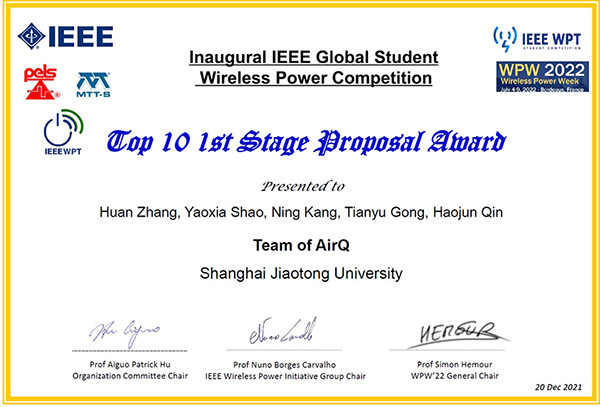
Wireless power transfer technology has revolutionized the way charging various electronic devices of daily life, making the process safer and more convenient. At present, the operation of major commercial wireless power systems requires that the transmitting coil and the receiving coil are closely attached. Since the magnetic field generated by the transmitting coil is often of one direction and uncontrollable, the charging process lacks spatial freedom. The existing solution mainly realizes the direct control of the magnetic field through three-dimensional transmitting coils, but the three-dimensional system occupies a relatively large space and is inconvenient for use in daily scenarios. Based on the study of the magnetic field shaping control theory, the project team proposed an innovative compact design of flattening the system by using a planar coil array instead of a three-dimensional transmitting coil.
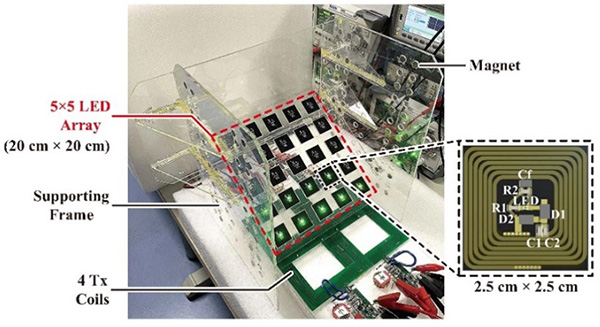
An LED array to visualize the magnetic field shaping
At present, the team has completed the theoretical demonstration of the new wireless power transmission system. By controlling the phases of each sub-transmitting coil in the coil array differently, the magnetic field shaping in three-dimensional space is realized and proposed a solution to minimize the mutual inductance between the sub-coils in the coil array. In terms of preliminary functional verification, the function of 6.78MH high-frequency wireless power transfer for two electronic devices at the same time has been completed, and the theoretical power can reach 15 W, which is the same level as most of the current commercial fast charging products.
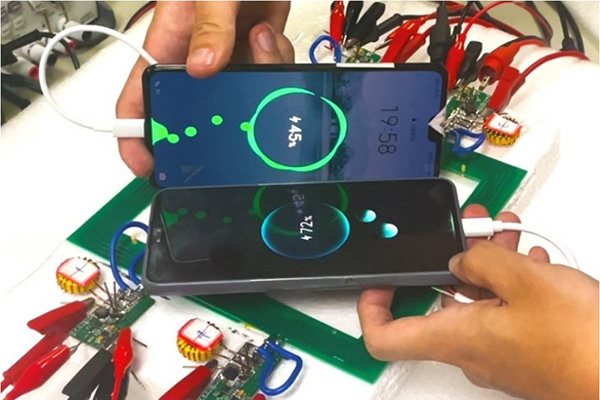
As an event project of IEEE Wireless Power Week, the Inaugural IEEE Global Student Wireless Power Competition attended by university students from around the world aims to encourage the young generations to join the research and development of wireless power transfer technology, and fully demonstrate the functionality of this important technology and its application in daily life scenarios. IEEE Wireless Power Week is the largest event in the world for wireless power research, covering a wide range of topics related to wireless power technologies across the electromagnetic spectrum.
Background Information
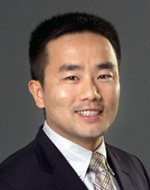
Chengbin Ma is a tenured professor at the University of Michigan-Shanghai Jiaotong University Joint Institute and a senior member of IEEE. He received the B.S. degree in industrial automation from East China University of Science and Technology, Shanghai, China, in 1997, and the M.S. and Ph.D. degrees in electrical engineering from The University of Tokyo, Tokyo, Japan, in 2001 and 2004, respectively.
From 2004 to 2006, he was an R\&D Researcher with the Servo Motor Laboratory, FANUC Limited, Japan. Between 2006 and 2008, he was a Postdoctoral Researcher with the Department of Mechanical and Aeronautical Engineering, University of California, Davis, USA. In 2008, he joined the University of Michigan-Shanghai Jiao Tong University Joint Institute, Shanghai Jiao Tong University, Shanghai, China, where he is currently a Professor of Electrical and Computer Engineering. His research interests include battery and energy management, wireless power transfer, dynamics and motion control, and wide applications in electronic devices, electric vehicles, microgrids, smart grids, etc.
Dr. Ma was the recipient of many teaching and research awards at Shanghai Jiao Tong University, such as Teaching and Education Award in 2020 and Koguan Top Ten Best Teacher Award in 2017. He also received Research Excellence Award from AirFuel Alliance, USA, in 2019. He is an Associated Editor for the IEEE Transactions on Industrial Informatics and IEEE Journal of Emerging and Selected Topics in Industrial Electronics. He served as Delegate of Energy Cluster (2019-20), and is now Chair of Shanghai Chapter, IEEE Industrial Electronics Society.
Dynamic Systems Control Lab focuses on the optimal design, management, and control of various dynamic systems, especially energy storage systems, micro-grids and smart grids, wireless power transmission systems, and electric vehicles. Laboratory research includes integrating interdisciplinary elements such as physical systems, control theory and design, sensing and actuating devices, and human behavior. Realizing a more efficient, smarter, more resilient, and more reliable dynamic system. The current main research directions of the laboratory include 1) energy storage system and energy management; 2) high-frequency power electronics and wireless power transmission; 3) mechatronics and motion control.
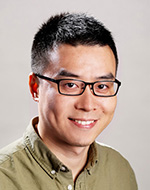
Ming Liu received the B.S. degree in mechatronic engineering from Sichuan University, Sichuan, China, in 2007, and the Ph.D. degree in electrical and computer engineering from the University of Michigan-Shanghai Jiao Tong University Joint Institute, Shanghai Jiao Tong University, Shanghai, China, in 2017.
From 2017 to 2020, he was a Postdoctoral Research Fellow with the Department of Electrical Engineering, Princeton University, USA. He joined the School of Electronic Information and Electrical Engineering, Shanghai Jiao Tong University, Shanghai, China, in 2020, where he is currently an Associate Professor of Electrical Engineering. His research interests include megahertz wireless power transfer, battery management systems, high frequency high performance power electronics for emerging applications.
Dr. Liu was the recipient of Top Ten Academic Star Award and Excellent PhD Thesis Award Nomination from Shanghai Jiao Tong University in 2016 and 2018, Research Excellence Award from AirFuel Alliance, USA, in 2019, and Best Paper Award of IEEE ECCE-Asia in 2020. He was a Guest Editor of IEEE Transactions on Industrial Informatics and serves as Chair of the Wireless Power Transfer for Energy Storage Charging Subcommittee of Energy Storage Technical Committee, IEEE Industrial Electronics Society.





